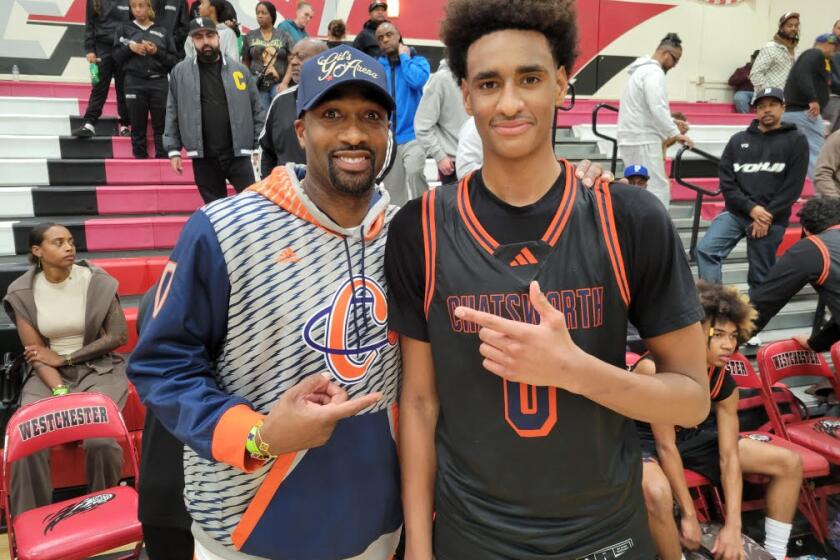U.S. teen’s ring time is short
BEIJING -- Javier Molina’s Olympic boxing experience lasted only eight minutes Sunday night.
But that was probably eight minutes too long.
Molina wasn’t cleared to fight until 24 hours before his first-round light-welterweight bout Sunday, which ended in a lackluster 14-1 loss to Bulgaria’s Boris Georgiev. And according to at least one doctor, it was a fight that never should have taken place.
After it was over, Coach Dan Campbell said Molina went into the bout with what Campbell described as a small hole in the boxer’s lung, which allowed air to seep out beneath the skin.
The condition, although not life-threatening, should have kept Molina out of the ring, said Edwin “Flip” Homansky, an emergency room physician and former Nevada State Athletic Commission member who spent more than 20 years as a ringside doctor.
“I would never put someone back into competition with that condition,” Homansky said by phone from Nevada.
The condition, which U.S. team physician Bill Kuprevich diagnosed as subcutaneous emphysema, can be caused by trauma as slight as a cough. And, Campbell said, it wasn’t detected until Saturday morning, when an EKG and chest X-rays were performed on Molina, who complained of a sore throat and shortness of breath that grew worse after he marched in Friday night’s hot and humid opening ceremony.
“It’s fairly common,” Kuprevich said, adding that Molina improved with medication and was cleared to fight.
However, Homansky, who made it clear he was speaking in general terms and not specifically of Molina, whom he has not examined, said there can be a danger in sending someone into strenuous activity with symptoms similar to the ones Kuprevich described.
“I wouldn’t let him go back into competition until I knew what caused it and that it wouldn’t happen again,” he said. “It would probably be weeks.”
Homansky said the increased pressure in the lungs caused by strenuous exercise could make the condition worse. And in such a weakened state, a boxer “wouldn’t be able to defend himself.”
That is exactly what happened with Molina, who never put up a fight against Georgiev, the reigning Olympic bronze medalist.
“I felt kind of sluggish,” the 18-year-old Commerce boxer said after the match. He never mentioned his medical condition.
“I felt too slow. I just wasn’t feeling too comfortable. I didn’t feel like myself.”
Campbell agreed.
“He did the best he could,” he said. “I think after the first round it affected him a lot. There was a big difference in Javy tonight.”
Campbell said Molina’s X-rays showed air bubbles around the boxer’s heart and lungs.
But after a series of physical tests Saturday evening, Molina was cleared to make weight.
“He made weight, they did other X-rays, the X-rays showed that a lot of it had dissipated and we felt that he could go,” Campbell said.
Molina is the second U.S. boxer in four days to have health-related issues in Beijing.
On Thursday, bantamweight Gary Russell Jr., considered to be a strong contender for a medal, was found unconscious and dehydrated on the floor of his dormitory room after returning from a run, part of a last-ditch effort to make his 119-pound weight limit.
Russell, 20, hasn’t fought at 119 pounds since October.
--
More to Read
Go beyond the scoreboard
Get the latest on L.A.'s teams in the daily Sports Report newsletter.
You may occasionally receive promotional content from the Los Angeles Times.











